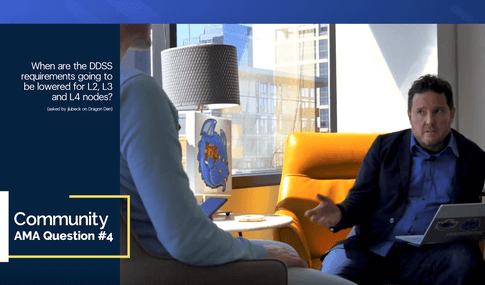Blockchain open sourcing, EAP, nodes & stupid people - Community AMA with Joe Roets.
1. What kind of additional tools are going to be built for Eternal? A question asked by Alexeth on Dragon Den.
Okay we don't have the entire roadmap laid out, especially publicly. But we're looking to monetize that application itself by adding cool new features for premium accounts. Because right now there are a lot of limitations. Because there could be a lot of spam, so part of that list is:
- Full image capture
- Video capture, or at least of a certain amount.
- Automated capture of all of your Tweets.
- Automated capture of all tweets to which you reply, things like that. So you can watch proof. What somebody said.
- Cryptographic signing of your tweets, at least selectively. If you want to sign this because you want people to know its you for certain.
- A page for someone to view your timeline even if you know, let's say Twitter bans you. At least you can say oh there's my old timeline, I didn't lose anything.
- A provable profile. We aren't certain how to integrate that yet, but one way or another for someone to come and know that this really is you. And this really is your key, with which you might sign something to prove they really are your Tweets.
2. The Dragonchain team seems to be very active with the community on numerous platforms like telegram and Twitter. Obviously there are a few bad apples that just want to throw mud at Dragonchain all the time. How do you stay energized and motivated each day? Asked by GritsngravyTX on Dragon Den.
I don't know about everybody on the team. But with all the FUD and the attacks sometimes it makes things difficult, especially trying to decide how to answer people. The overall positive energy of the community does motivate and especially when we get feedback for new ideas. What can we build? How do we build it? Various other parts of the system that we've really come to use the community in a way that is pretty unique in business. And I mean there's hope so many bad apples in particular social environments, but you know there are a lot of stupid people in the world.
3. Can we get a time frame for when the Early Access Program will end and will we be able to participate in running nodes after that happened? Asked by Ubercooter on Reddit.
We have plans for the end of the early access program, primarily centered on the things we need to do to make it scalable, on the existing platform. And for future on-premise. And that requires applied TIME to a node, it requires pooled verification nodes, so that even people with really low TIME can still take part and can still have a fair and proportional reward for taking part. And then we're also looking to open source so, the verification nodes can be run on your own laptop or in your own environment if you're a business. So there are a few things in order and it's coming. It's coming, as soon as we can get it to come, so won't be long.
4. When are the TIME requirements going to be lowered for the L2, L3 and L4 nodes? Asked by Jlubeck on Dragon den.
Right, because they're very high right now. That was primarily because we've been testing and retesting, and you know we've had a few very valuable results that we've been able to handle. And to make sure everything's gonna work. So it's designed, its scheduled, it's being built right now. The answer is soon. So it requires:
- Applied TIME. That is taking your entire TIME and saying I want to apply 1 million TIME to this node.That's the application of it and that's being written right now, being built.
- Pooled nodes, where they would be managed service nodes. Just like currently, but nearly anyone could run them. Even if you have a really low TIME score and frankly, the more TIME you have, the more of the fees you will get. So it's particularly valuable for everyone and for us, it's very scalable. We don't have to worry about some of the inherent costs that there would be otherwise.
- Open sourcing. The third and a major thing is the planned blockchain open source of the core platform. Which among other things will allow someone to run verification nodes in their own environment or laptop or desktop. And since it's not a proof-of-work, it is something you really could run on your laptop, not a big deal. So mostly it just requires the connectivity and we're really trying to hit that hard as soon as we can. Because then all of a sudden you have much greater decentralization at a lower verification level. Right now we're leveraging level fives verification nodes like Bitcoin and Ethereum and so on to really decentralize the proof. But with the open sourcing of the core platform we'll have a much more robust network.
